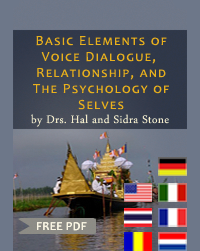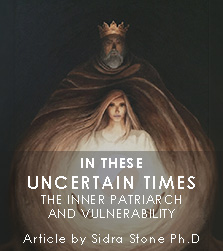by Hal Stone, Ph.D.
Introduction
There is one thing that is fairly sure in life and
that is that we are likely to become ill in the
course of our lives and that we will all die at
some point. Illness and our feelings about death
affect us in varying degrees and in varying ways.
Catching a cold doesn’t tend to destabilize us too
much. Developing cancer, however, is a major
event and affects our life in major ways.
The medical model was historically designed to help us get rid of our illness and it still operates in this way. It is what has come to be known as the target approach to illness and to symptoms and it involves finding the correct drug or the correct treatment procedure that is designed to eliminate the symptom.
Having been ill a number of times in my life, I have always appreciated this target approach and the help I have received from medical practitioners in helping to clear up both major and minor symptoms that have developed through the years. I have learned, however, that getting rid of symptoms isn’t the whole story. Illness also provides us with a most amazing opportunity to look more deeply into ourselves. If approached properly, illness of all kinds can become a major teacher to us as we move through life.
It seemed initially that alternative medicine or holistic medicine would shift away from this target approach but the reality is that the opposite is the case. Most practitioners of alternative medicine remain quite focused on the idea of getting rid of illness. I have had an excellent network of alternative practitioners working on my behalf for well over 35 years, I have been very grateful to them and to the multitude of healing modalities that have developed through their efforts. I most certainly have used both the traditional and alternative systems on many occasions. Something major, however, is left out with this target approach and that is what this article is about.
Serious Illness
When we become ill with a serious illness something
very different happens to us and it tends
to be a very upsetting experience. We are faced
with the possibility of death. We are faced with
the reality of a loss of control of our bodies. We
are faced with the possibility of being crippled or
having to deal with chronic pain.
Most people take an aspirin when they have a headache. I don’t blame them! When the headaches become chronic they may still want aspirin because their focus remains locked onto the idea of getting rid of the symptom.
Other people however begin to ask questions. “Why do I get these headaches so often? They always seem to come after intense bouts of work and focused activity! Am I pushing too hard? My girlfriend tells me I’m too intense.”
Such people take this opportunity to step back from the symptom and begin to use the illness as something that has possible meaning. They may still be trying to get rid of the symptom. The two approaches are not at all mutually exclusive. More and more, however, their focus moves towards the meaning of illness. They begin to look for the teaching and meaning of the symptoms.
Throughout the 1970s I was the founder and director of the Center for the Healing Arts in Los Angeles. We were an educational and research center in holistic medicine. Jeanne was a 50 year old woman who came to the center for help. We insisted that all clients at the center be under total medical care for their conditions and we were available to work with them in diverse ways if they wished to explore the meaning of the cancer experience in their lives. Her cancer took the form of a serious melanoma in the groin area that was growing quite rapidly before she had it surgically removed. She began to explore her life in a very different way after the surgery and though she continued all of her medical and alternative work to heal the cancer, the idea of her illness as a teacher to her became increasingly her primary focus.
After three or four months she had the following dream:
“I’m climbing a very steep mountain with other members of my cancer group. We come to a narrow ledge on which there is a tree growing and the tree has a large unnatural growth about a third of the way up its trunk. It reminds me of my cancer before surgery. I grab hold of the unnatural growth and use it to pull myself up to the ledge so I can begin to climb again on the next phase of our journey together.”
This is a remarkable dream that illustrates so well the principle of illness as teacher. She is on a journey with other people from her group at the Center. She uses the “unnatural growth” to help herself climb onto the ledge so that she can continue her journey. It was a few months later that Jeanne asked to talk with me privately. When we met she thanked me for my efforts on her behalf. She also told me that she was glad that she had developed cancer. “Nothing else could have broken me out of my frozen life pattern but an illness of this magnitude. I’m not afraid of living any longer and I’m not afraid of dying.” Jeanne did indeed die six months later, but her death was a thing of beauty as it became a natural part of her process.
When we turn towards the meaning of illness the dream process is often of great help to us as we begin our psycho-spiritual exploration.
An Example of Working with Selves
Voice Dialogue is a remarkable way of approaching
illness. In the early seventies I was
approached by Sara, a woman in her forties, who
had suffered from stomach pains for over three
years. She was quite wealthy and she been completely
evaluated by many medical groups, hospitals
and individuals but nothing had helped her.
She led a very busy life and I suspected that she
had a strong Pusher energy operating in her. So
in the first session I worked with her Pusher and
made an initial separation so that an Aware Ego
process had started and she had some beginning
sense of how driven she was. In this voice her
stomach pains were still present and intense.
After we talked for a few minutes in the Aware Ego I asked Sara to move to the other side to “being” energy. She moved over and sat silently for a few minutes. It was the first time in her life that she ever remembered just sitting and being with someone without words or planning or work. She began to talk about how she was feeling, which was different than anything she had ever known. At a certain point I asked her how her stomach was feeling and she reported no pain at all. She really couldn’t quite believe it. I moved her back to the Pusher and the pain returned. I then moved her again to “being” energy and the pain disappeared. I’m not sure who was more shocked, the client or myself!
Within a few short minutes she had moved from a victim mentality in which “her body was constantly betraying her” to a totally new kind of exploration of a number of major disowned self systems that included her introversion and her “being” energy, ways of being that had been totally negated growing up in her family system.
You Caused Your Illness
One of the more damaging ideas that came out
of the holistic movement of the seventies and
that continues today to some extent goes something
like this: “You caused your illness! Since
you caused it and are responsible for it, you have
the power to make yourself well!”
The statement is generally well intentioned. We know that many illnesses are caused by the negation of disowned selves. If you suffer from headaches and someone convinces you that you are causing those headaches and that if you can discover the root cause then you have the power to cure the headaches.
The damage of this way of thinking and this kind of advice occurs in two ways. First of all, it is the Inner Critic that generally takes in the statement. Inner Critics are giants in the psyches of most people. When the Inner Critic gets hold of this kind of idea it is really bad news and - not only do you have a headache that hurts - but it is your own fault!
The other consideration has to do with the fact that such thinking is also applied to catastrophic illnesses such as cancer. Imagine some friend saying to you: “You caused your cancer. Since you are responsible for having developed cancer, you have the power to cure it.” Truly, with friends like this who needs enemies? Yet I have watched a multitude of patients die the most distressing deaths because they had been given this advice and their Inner Critics had taken it in and then their Pusher has gone crazy trying to rectify the damage they have done by driving themselves harder and harder to heal their wrongdoing.
Life and Illness as a Path
We don’t know what causes cancer. We know
psycho-spiritual factors may be involved in certain
patients, but there are genetic and environmental
issues and a host of unknown factors that
are also involved. How much more healing, how
much more elegant to say to someone: “Continue
your efforts to heal your cancer. However, while
you are doing this, let’s consider the meaning of
this illness in your life. Let’s think about your
cancer as a teacher. What has it opened up for
you? What are your dreams saying? Let’s talk
about your vulnerability and what you do with
this in your life and with your family. We can’t
promise to cure you. We don’t know how to do
that but we can join with you in the search for
meaning that this illness can open up for you.”
How much more elegant a way of being a friend
than feeding the Inner Critic streak and eggs
and potatoes and toast with peanut butter and
jelly every morning.
For Sidra and myself the paradigm of Illness
as Teacher can be applied to all life experiences.
Life has many ways of destabilizing us. We can
so easily fall victim to these ongoing events or we
can recognize that every destabilization is an opportunity
for new discovery or, as Sidra so aptly
expresses it, to move out of the pot-bound mentality
of our primary self system. Illness gives us a
chance to allow the pot to crack gracefully rather
than trying throughout our lives to constantly attempt
to repair the natural cracks that inevitably
get bigger over time.
© 2005






